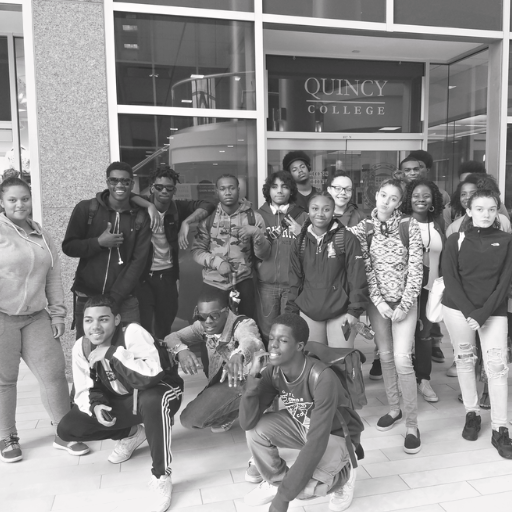Early College
JFYNet helps high school students get a head start on post-secondary education
Early college (also called dual enrollment) brings college courses into the high school where students can take them for dual high school and college credit. The courses are usually taught during the school day, co-taught by high school teachers and college professors. JFYNet partners with schools to provide support and coaching for students. The program builds skills and confidence and reduces the time and cost of a college degree.
Post-secondary education is the most important single determinant of future earnings. More than two-thirds of jobs in Massachusetts require post-secondary training, and that proportion is rising. Yet even as the equity gap between college graduates and non-graduates widens, college enrollments are declining. Fewer than half of Massachusetts high school graduates go on to earn any form of post-secondary credential. Some high school graduates bypass college because they need to work. Others are deterred by the rising cost of higher education. Many high school students do not think they have the academic skills for further training. But whatever the obstacle, young people who do not obtain post-secondary credentials will be handicapped in the competition for better jobs, higher incomes, stable and secure lives.
Early College students can earn 12 or more college credits that will transfer throughout the state higher education system and count toward a degree.
Support for Early College
JFY provides enhanced academic and guidance support to help students meet the academic and behavioral challenges posed by Early College, a state initiative that offers free college courses to students in high school.
Early College courses award both high school credits toward graduation and college credits that can be transferred throughout the state’s higher education system. The Initiative enables high school students to jump-start their progress toward a post-secondary degree while reducing the total cost of the degree with free credits earned in high school.
The program offers a great opportunity but requires a higher level of academic rigor and personal responsibility than high school. JFY’s support includes academic skill-building and addresses social and behavioral competencies such as study skills, self-advocacy, goal-setting, time management, student ownership of learning, self-confidence, and other personal issues.
JFY utilizes available assessment data including MCAS, MAPS, Accuplacer, and our own and school assessments to determine student readiness for college-level coursework. Guided by the data, we apply our JFYNet online instructional resources to help teachers address gaps in knowledge and skills. JFYNet staff support teachers in providing supplemental instruction that aligns with state standards and course curricula. They also provide direct student support as tutors, advisors, counselors, and facilitators to help students with academic tasks (class assignments, homework, papers, projects, and study time management) and college navigation (learning management systems, faculty office hours, college services, and protocols). These services support students’ academic and emotional growth and help them balance the new Early College expectations and their other social and family involvements and obligations.
The Early College Initiative strives for social and economic equity by requiring equitable access to college courses for demographic groups historically underrepresented in higher education, JFY’s primary constituency since our beginning.
From the inception of the Early College Initiative in 2017 to the end of the 2021-22 school year, JFY worked with 4 colleges, 5 high schools, and 781 students who earned 2052 college credits. The tuition value of these credits is $1,095,000—a substantial contribution to the college funds of our students and a welcome gift of savings to their families.
Yet even as the opportunity gap between college graduates and non-graduates widens, college enrollments are declining.
Fewer than half of Massachusetts high school graduates go on to earn any form of post-secondary credential. Some high school graduates bypass college because they need to work. Others are deterred by the rising cost of higher education. Many high school students don’t think they have the academic skills for further training. But whatever the obstacle, young people who do not obtain post-secondary credentials will be handicapped in the competition for better jobs, higher incomes, stable and secure lives.

JFYNet early college support helps students overcome the obstacles and get on the post-secondary track before they leave high school.
JFYNet works with students as early as 9th grade to build the skills and the confidence for college-level work. JFY works in tandem with early college courses by providing scaffolded academic interventions to develop higher-level skills commensurate with the course requirements. JFY also directly supports students taking college classes by offering an orientation to college courses along with college adjustment coaching. Throughout the semester JFY staff guide students through the differences between high school and college rigor, expectations, and responsibilities for learning.
Students who had thought college beyond their skills or means can change their minds after the experience of success and a breakdown of actual costs and available scholarships. One student who had thought college out of reach said, “After this program, I can see my future in college. I really know I’m going to college. I’m already there.”
Early College students can earn 12 or more college credits that will transfer throughout the state higher education system and count toward a degree.










